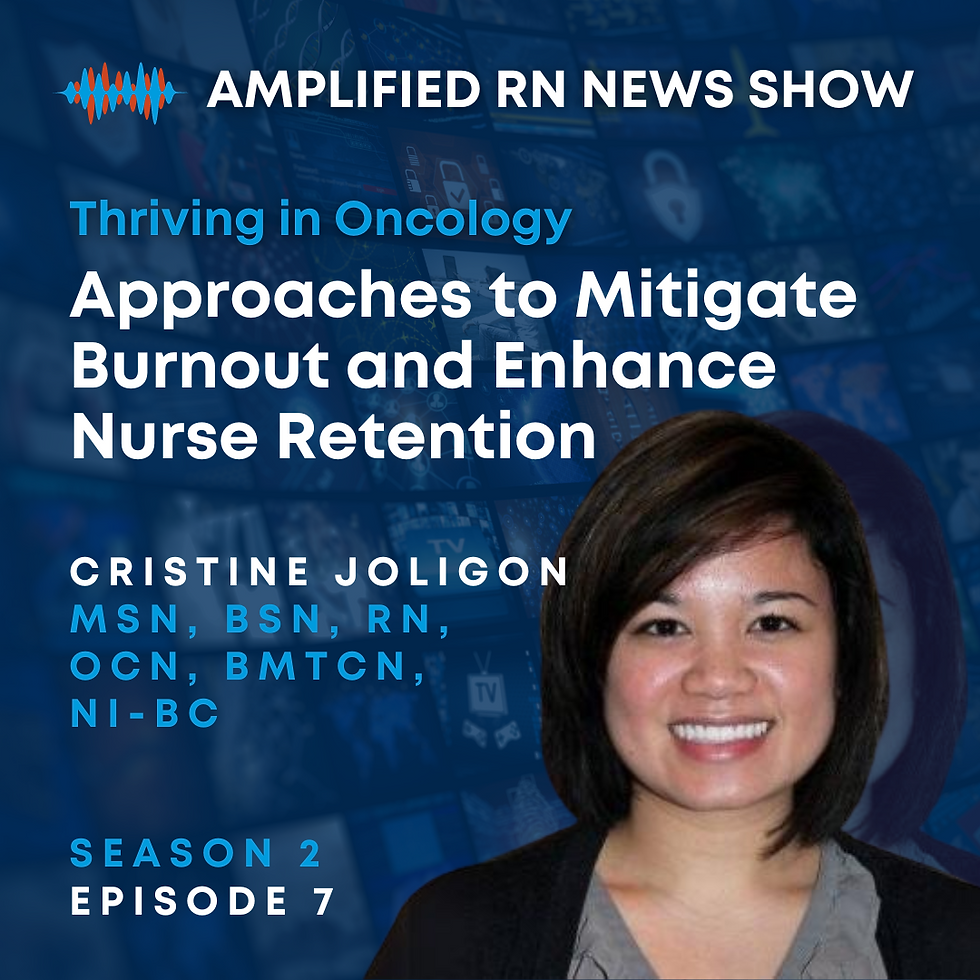Rethinking the Nursing Shortage through Investments in Academia | E9 - Amplified RN News Show
- ANA California Staff

- Jul 27, 2023
- 4 min read
Make'da Traynum MSN, RN, 2022 ANA\California Advocacy Institute Fellow and media-trained nurse, advocates for investments in nursing education programs to combat contributing factors of the nursing workforce shortage.
Media request? Contact relations@anacalifornia.org
Interested in media training for nurses? Join our waitlist.
Jared Fesler 0:16
Welcome to the Amplified RN News Show where we're turning up the volume on nursing news in California. Today we're going to be diving into the topic of rethinking the nursing shortage through investments in academia. We're joined today by ANA\California member and media-trained nurse Make'da Traynum. Make'da thank you so much for being here today. Tell us just a little bit why you're an expert on this topic.
Make'da Traynum 0:38
Thank you so much, Jared. My name is Make'da Traynum with a master's of nursing and nursing leadership. I've been a travel nurse for nine and a half years. So I've been able to see the nursing shortage at hand, especially during the COVID pandemic. I'm also a nursing advocate for our communities, as well as for our fellow nurses. So I'm glad to be here to discuss this topic.
Jared Fesler 1:06
Wonderful. Thank you for being here. Can you tell us a little bit more about this nursing shortage, especially through the lens of academia, you know, many nurses are very aware of the nursing shortage, but there are many angles to this. Tell us more.
Make'da Traynum 1:23
Oh, we're glad to. Um, so for instance, it looks like working in the hospital. As a travel nurse, I have seen firsthand how new graduates come into the workplace and are immediately overwhelmed because they are not fully prepared for the clinical setting that they are putting on their shoulders. That can also be to the fact that during the COVID pandemic, there were emergency waivers that were put into place where they were rushed through the academia, the academic settings in order to immediately take on the brunt work that was placed on them by the hospital administration due to already nursing shortages.
Jared Fesler 2:12
And I'm sure as we've seen other reports relative to burnout, mental health and stress, are you saying that that rushed through that process has had a negative impact on our workforce?
Make'da Traynum 2:25
It definitely has had a negative impact on our workforce, just for instance, the nursing shortage. It's been documented by the assignments university that 55% of the RN workforce is ages 50 or older. So more than 1 million registered nurses are predicted to be retired in the next 10 to 15 years, for an instant. And then also during the COVID pandemic, there was such a high turnover rate.
Jared Fesler 2:54
So what are you calling for academics and healthcare leadership to do what solution are you proposing?
Make'da Traynum 3:03
That's a wonderful question, Jared. Well, it looks like it will be great for them to invest in the nursing academia, starting with our nursing professionals in the in the clinical setting, as well as for in the schools as well.
Jared Fesler 3:25
Are you asking that these nursing professionals joining in academia be required to meet certain clinical standards or trainings? How would it be a little bit different than the process that they're in today?
Make'da Traynum 3:42
So yes, so that would entail investing in their pay packages. So they're able to entice more qualified nurses, which could mean that they have most they have more recent clinical experience in the clinical setting. And within that timeframe, which is most appropriate that reflects how the hospital culture is currently. And so what
Jared Fesler 4:15
are the actionable steps that nursing academics, hospital leadership and even the general public as we know this ultimately, at the end of the day is this patient safety issue? What steps can they take today to to address this nursing shortage issue and the preparation of our incoming new nurses?
Make'da Traynum 4:37
What we can do is definitely have the general public because it starts with you to be able to advocate for our fellow nurses as these are a public servants within our communities so affects me you, our neighbors and our loved ones by contacting your local and state governments, as well as contacting your board of nurses as well as healthcare stakeholders, including your CEOs, as well as chief of nurses have at your local hospitals to address this issue, because it may not affect you right now, but it will eventually affect you someday, or your loved one. Because being sick is something that is common within our society.
Jared Fesler 5:25
And for nursing academics, what can they do to ensure that preceptorships meet these minimum requirements and better prepare our new nurses.
Make'da Traynum 5:38
That would also mean that we need to create a better structure of curriculum for our incoming nursing students as well. To have to be able to pump out more qualified nurses.
Jared Fesler 5:59
Make'da thank you so much for joining and having some time for us today. Incredible topic. It is not going to go away anytime soon and needing real solutions to address the nursing shortage is going to come in many ways and different facets. So thank you for your time and insights. Thank you for those that are tuning into today's episode of the Amplified RN news Show, and we'll see you in the next one. Thanks so much for having me.



Comments